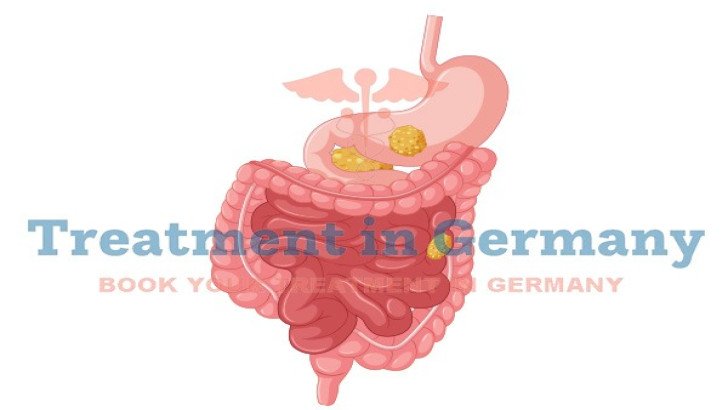
Germany is a global pioneer in advanced oncology, driving transformative therapeutic innovations for gastrointestinal neuroendocrine tumors (GI NETs). In 2025,
Germany is a global pioneer in advanced oncology, driving transformative therapeutic innovations for gastrointestinal neuroendocrine tumors (GI NETs). In 2025, GI NET patients benefit from precision medicine, immunotherapy advancements, targeted radionuclide therapies, and AI-driven diagnostics, all aimed at enhancing survival outcomes and quality of life.
Gastrointestinal neuroendocrine tumors (GI NETs) are rare, heterogeneous malignancies arising from neuroendocrine cells in the digestive tract, including the stomach, intestines, pancreas, and appendix. They range from slow-growing, indolent tumors to aggressive neuroendocrine carcinomas (NECs). Risk factors include genetic predispositions (e.g., MEN1 mutations), chronic inflammation, and family history. German oncology centers excel in delivering personalized cancer care, integrating targeted therapies, minimally invasive procedures, and clinical trials to combat disease progression and improve patient outcomes.
Early recognition of GI NET symptoms is critical for timely treatment and improved prognosis. Common symptoms vary by tumor location and hormone secretion:
These symptoms may mimic irritable bowel syndrome or other conditions, necessitating diagnostic precision. German endocrinologists and oncologists use advanced diagnostic tools to confirm GI NETs and guide therapeutic strategies.
Ensuring Diagnostic Precision for GI NET Treatment
Diagnostic precision is the cornerstone of effective GI NET treatment. German oncology centers employ cutting-edge diagnostic tools:
German radiologists and geneticists ensure rapid, accurate diagnostics, enabling personalized treatment plans for GI NET patients.
Latest Advancements Redefining GI NET Treatment
Germany’s therapeutic breakthroughs in 2025 are transforming GI NET treatment, offering innovative solutions for low-grade and high-grade tumors through clinical trials and precision oncology.
Targeted Radionuclide Therapies: Precision Radiation Delivery
Targeted radionuclide therapies are revolutionizing GI NET treatment, particularly for somatostatin receptor-positive tumors:
German nuclear medicine specialists lead in radionuclide therapies, optimizing disease control.
Immunotherapy Advancements: Activating the Immune System
Immunotherapy is expanding options for GI NET treatment:
German immunologists integrate immunotherapy with combination therapies to boost clinical outcomes.
Minimally Invasive and Surgical Interventions
Minimally invasive procedures and surgery are critical for localized GI NETs:
German surgeons and interventional radiologists use advanced imaging to enhance precision.
Targeted Therapies and Molecular Inhibitors
Targeted therapies address specific genetic mutations:
AI-Driven Innovations in GI NET Care
Artificial intelligence enhances GI NET treatment:
German researchers lead in AI-driven diagnostics, advancing precision oncology.
Clinical Trials Driving Therapeutic Breakthroughs
Germany’s clinical trials fuel GI NET advancements:
Why Germany Excels in GI NET Treatment
Germany offers unparalleled advantages for GI NET patients:
Risk Factors and Prevention Strategies for GI NETs
Preventing GI NET recurrence supports therapeutic efficacy. Key risk factors include:
German specialists recommend genetic screening, regular endoscopy, and healthy lifestyles to reduce disease risk.
Comprehensive Multidisciplinary Cancer Care
Germany’s multidisciplinary cancer care integrates:
This approach optimizes patient outcomes.
Post-Treatment Support and Enhancing Quality of Life
Post-treatment care includes:
Challenges and Future Horizons
Challenges include tumor heterogeneity and therapy resistance. German researchers address these through:
Future therapeutic breakthroughs promise enhanced clinical outcomes.
Conclusion
Germany’s latest advancements in GI NET treatment offer hope through radionuclide therapies, immunotherapy, minimally invasive procedures, and AI-driven diagnostics. With multidisciplinary cancer care and holistic support, German oncology centers achieve superior survival outcomes and quality of life, positioning Germany as a global leader in GI NET care.
Frequently Asked Questions
What are the latest advancements in GI NET treatment in Germany in 2025?
Germany leads with Lu-177 DOTATATE PRRT, checkpoint inhibitors, dendritic cell vaccines, CAR T-cell therapy, and AI-driven diagnostics, significantly improving survival outcomes.
What symptoms indicate the need for GI NET treatment?
Symptoms include abdominal pain, flushing, diarrhea, jaundice, unexplained weight loss, and fatigue, often detected through endoscopy or CgA testing.
How is eligibility for advanced GI NET treatments determined in Germany?
Through Gallium-68 DOTATATE PET-CT, EUS, genomic profiling, liquid biopsies, and CgA tests, ensuring diagnostic precision for personalized treatment plans.
What clinical trials are driving GI NET treatment advancements in Germany?
Trials like NETTER-2, CABINET, and CAR T-cell studies explore PRRT, immunotherapy combinations, and targeted therapies for low- and high-grade NETs.
What follow-up care is provided after GI NET treatment in Germany?
Comprehensive care includes monitoring with CgA tests and imaging, rehabilitation for nutritional deficiencies, and emotional wellness support through counseling and support groups.
How does Germany compare to the UK or US for GI NET treatment?
Germany excels with therapeutic innovations, rapid access to clinical trials, advanced diagnostic tools, and holistic care strategies, offering superior patient outcomes.
Can these treatments prevent GI NET recurrence?
Immunotherapy and targeted therapies reduce recurrence risk by targeting residual cancer cells and inducing immunological memory, as shown in clinical trials.
Does Germany support international GI NET patients?
Yes, hospitals in Germany provide language assistance, travel coordination, and emotional wellness programs to ensure seamless care for global patients.
What are the most promising advancements in GI NET treatment in Germany?
AI-driven antigen selection, Actinium-225 PRRT, CAR T-cell therapy, oncolytic viruses, and combination therapies are pushing the boundaries of precision oncology.
How do Germany’s advanced GI NET treatments differ from traditional therapies?
Unlike traditional chemotherapy or surgery, advanced treatments use precision medicine, radionuclide therapies, and immunotherapy for targeted anti-tumor efficacy, minimizing side effects.
For more information or a free consultation, visit our contact us page.
Kindly complete the form below, and our dedicated team will reach out to you promptly. We look forward to connecting with you soon!
Trierer Straße, 56072 Koblenz, Germany

.webp)
 (1).webp)

.webp)
 (1).webp)


.webp)
 (1).webp)

.webp)
 (1).webp)
